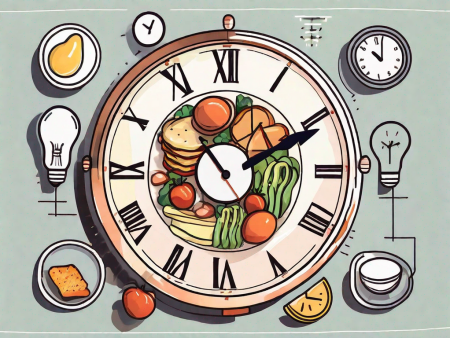Discover the relationship between metabolism rate and weight in this informative article.
How Does Metabolism Rate Affect Weight?
Metabolism: the mysterious force that seems to hold the secret to weight loss and weight gain. But what exactly is metabolism and how does it impact our weight? Let’s dive into the world of metabolism and uncover the truth behind its influence on our scales.

Understanding the Concept of Metabolism
Metabolism is like the engine that powers our bodies. It’s the chemical processes that occur within us to maintain life. Think of it as a bustling factory where calories are burned and energy is produced. Our metabolism determines how quickly or slowly we burn calories, ultimately affecting our weight.
But what exactly happens inside our bodies when we talk about metabolism? Well, it all starts with the food we eat. When we consume food, our bodies break it down into smaller molecules through a process called digestion. These molecules are then transported to our cells, where they are further broken down to release energy.
Now, you might be wondering, why do we need energy? Energy is crucial for our bodily functions such as breathing, digestion, and circulation. It’s what allows our heart to beat, our lungs to expand and contract, and our stomach to digest food. Without energy, our bodies wouldn’t be able to perform these essential tasks.
The Role of Metabolism in the Body
Metabolism is responsible for converting food into energy, which is crucial for bodily functions such as breathing, digestion, and circulation. It’s a non-stop process that keeps us going, even when we’re fast asleep. So, the next time you’re enjoying a tasty meal, give a nod of appreciation to your hardworking metabolism.
But metabolism isn’t just about energy production. It also plays a role in maintaining our body temperature. When we eat, our bodies generate heat as a byproduct of the metabolic process. This heat helps keep us warm, especially in colder environments.
Additionally, metabolism is involved in the synthesis of new molecules in our bodies. It’s responsible for building and repairing tissues, such as muscles and bones. Without metabolism, our bodies wouldn’t be able to heal wounds or grow new cells.
Different Types of Metabolism
Not all metabolisms are created equal. Some individuals seem to effortlessly burn through calories, while others have a more conservative metabolism. While genetics and other factors play a role, it’s essential to understand that everyone’s metabolism is unique to them. Don’t worry, though; there are ways to rev up your metabolism and take control of your weight destiny!
One factor that influences metabolism is muscle mass. Muscles are more metabolically active than fat, meaning they burn more calories even at rest. So, incorporating strength training exercises into your fitness routine can help increase your metabolism by building lean muscle.
Another way to boost your metabolism is through regular physical activity. Engaging in aerobic exercises, such as running or cycling, can temporarily increase your metabolic rate, leading to more calories burned. Additionally, staying active throughout the day, such as taking the stairs instead of the elevator or going for a walk during your lunch break, can also contribute to a higher metabolism.
Lastly, proper nutrition plays a significant role in metabolism. Eating a balanced diet that includes a variety of nutrient-rich foods can help optimize your metabolic rate. Foods rich in protein, such as lean meats, fish, and legumes, require more energy to digest and can increase your metabolism. Similarly, spicy foods, like chili peppers, contain compounds that can temporarily boost your metabolic rate.
So, while metabolism may seem like a complex concept, it’s an essential process that keeps our bodies functioning. Understanding how it works and the factors that influence it can empower us to make choices that support a healthy metabolism and overall well-being.
The Connection Between Metabolism and Weight
We’ve all heard the phrase “metabolism affects weight,” but how does it really work? Well, my friend, let’s uncover the truth behind this metabolic mystery.
Metabolism, simply put, is the process by which your body converts the food you eat into energy. This energy is then used to fuel various bodily functions, such as breathing, digestion, and physical activity. But did you know that your metabolism also plays a crucial role in determining your weight?
How Metabolism Influences Weight Gain
Imagine your metabolism as a stubborn squirrel stashing away acorns. When you consume more calories than your body needs, this squirrel-like metabolism of yours will store those surplus calories as fat for future use. That’s right; your metabolism can be quite the hoarder!
But it’s not just about the quantity of calories you consume. The quality of the food you eat can also affect your metabolic rate. Highly processed and sugary foods can cause spikes in blood sugar levels, leading to insulin resistance and a sluggish metabolism. So, it’s time to kick those vending machine cravings and opt for some wholesome, nutrient-packed foods instead!
Furthermore, certain factors can influence your metabolism and contribute to weight gain. Age, for instance, can slow down your metabolism, making it easier to gain weight and harder to lose it. Hormonal imbalances, such as those associated with conditions like hypothyroidism, can also affect your metabolic rate.
How Metabolism Influences Weight Loss
If your metabolism loves to store those calories, wouldn’t it be great if it also loved to burn them? Well, good news! With the right approach, you can turn your metabolism into a lean, mean calorie-burning machine.
Regular physical activity can help raise your metabolic rate and keep those calories in check. Strength training, in particular, can boost your metabolism by building lean muscle mass. So, grab those dumbbells and get ready to flex that metabolism!
In addition to exercise, other lifestyle factors can also impact your metabolism and aid in weight loss. Getting enough sleep, for example, is crucial for maintaining a healthy metabolic rate. Studies have shown that sleep deprivation can disrupt your metabolism and lead to weight gain.
Furthermore, staying hydrated is essential for a well-functioning metabolism. Drinking enough water can help regulate your body temperature, transport nutrients, and eliminate waste products. So, don’t forget to keep a water bottle handy throughout the day!
Lastly, managing stress levels is important for maintaining a healthy metabolism. Chronic stress can lead to hormonal imbalances, which can negatively impact your metabolic rate. Incorporating stress-reducing activities such as meditation, yoga, or spending time in nature can help keep your metabolism in check.
In conclusion, your metabolism plays a crucial role in determining your weight. By understanding how it influences weight gain and weight loss, you can make informed choices about your diet, exercise routine, and overall lifestyle to optimize your metabolic health. So, embrace the power of your metabolism and embark on a journey towards a healthier, happier you!
Factors Affecting Metabolism Rate
Now that we understand how metabolism impacts our weight, let’s explore the factors that can influence our metabolic rate.
Metabolism, the process by which our bodies convert food into energy, is a complex and fascinating system. It is influenced by various factors, including age, gender, and genetics. Understanding these factors can help us make informed choices to optimize our metabolic rate and achieve our weight goals.
Age and Metabolism
Remember when you could eat an entire pizza without a care in the world? Ah, the good old days. Sadly, as we age, our metabolism tends to slow down. This means we burn fewer calories, making weight loss a little trickier. But fear not, because healthy habits can keep your metabolism fired up and ready to tackle whatever comes your way.
As we get older, our bodies undergo various changes. One significant change is the gradual loss of muscle mass, known as sarcopenia. Muscle tissue is more metabolically active than fat tissue, meaning it burns more calories at rest. Therefore, a decrease in muscle mass can lead to a decrease in metabolic rate.
Additionally, hormonal changes that occur with age, such as a decline in estrogen and testosterone levels, can also affect metabolism. These hormonal shifts can contribute to a decrease in muscle mass and an increase in body fat, further slowing down the metabolic rate.
However, despite these natural changes, there are ways to maintain a healthy metabolism as we age. Regular exercise, particularly strength training exercises, can help preserve muscle mass and boost metabolic rate. Eating a balanced diet rich in lean protein, whole grains, fruits, and vegetables can also support a healthy metabolism.
Gender and Metabolism
Ladies, it’s time to celebrate because research shows that women tend to have a higher percentage of body fat and a slower metabolic rate compared to men. But that doesn’t mean we can’t achieve our weight goals. Remember, metabolism is just one piece of the puzzle, and with the right lifestyle choices, we can unlock our full potential!
Biological differences between men and women contribute to variations in metabolic rate. Men generally have a higher muscle mass and a higher basal metabolic rate (BMR) compared to women. BMR refers to the number of calories our bodies burn at rest to maintain basic bodily functions, such as breathing and circulation.
However, it’s important to note that metabolic rate is not solely determined by gender. Factors such as body composition, physical activity level, and overall health also play significant roles. By focusing on building lean muscle through strength training, engaging in regular physical activity, and adopting a balanced and nutritious diet, women can optimize their metabolic rate and achieve their weight goals.
Genetics and Metabolism
Blame it on your genes! Studies suggest that genetics can play a role in determining our metabolic rate. Unfortunately, we can’t change our genes, but we can change our habits. By adopting healthy eating patterns and an active lifestyle, we can positively influence our metabolic rate, regardless of our genetic predispositions.
Our genetic makeup can influence various aspects of metabolism, including how efficiently we process and store nutrients. Some individuals may have a naturally faster metabolic rate, allowing them to burn calories more quickly, while others may have a slower metabolic rate, making weight management more challenging.
However, it’s important to remember that genetics are not the sole determinant of metabolic rate. Lifestyle factors, such as diet and exercise, can have a significant impact. By making conscious choices to prioritize whole, nutrient-dense foods and engaging in regular physical activity, we can support a healthy metabolism and overcome any genetic predispositions.
Furthermore, maintaining a consistent sleep schedule, managing stress levels, and staying hydrated are additional lifestyle factors that can positively influence metabolic rate.
In conclusion, while age, gender, and genetics can influence our metabolic rate, they do not define our destiny. By understanding these factors and making conscious choices to prioritize our health, we can optimize our metabolism and achieve our weight goals. Remember, every small step towards a healthier lifestyle counts!
How to Boost Your Metabolism
Ready to make friends with your metabolism and give it the boost it deserves? Let’s explore some tried and true methods to rev up that engine of yours!
Diet and Metabolism
Did you know that some foods require more energy to digest than others? It’s true! Incorporating metabolism-boosting foods like lean proteins, whole grains, fruits, and vegetables into your diet can give your metabolism a little extra kick. And don’t forget the water! Staying hydrated can also help keep your metabolic processes running smoothly.
But wait, there’s more! Spicy foods containing compounds like capsaicin can temporarily increase your metabolic rate. So, don’t be shy with the hot sauce; your metabolism will thank you!
Exercise and Metabolism
Moving our bodies not only benefits our physical and mental health but also has a remarkable impact on our metabolism. Both cardio exercises and strength training can elevate your metabolic rate for hours after your workout. So, whether you prefer a sprint or a squat, find what gets your heart pumping and your metabolism jumping!
Debunking Metabolism Myths
Ah, myths, those sneaky little creatures that love to twist the truth. Let’s shed some light on a few common metabolism myths and separate fact from fiction.

The Truth About ‘Fast’ and ‘Slow’ Metabolism
Some folks claim to have a “fast” metabolism that allows them to eat everything in sight without gaining a pound. While it’s true that some people naturally burn more calories, it’s not all about speed. Factors like body composition, muscle mass, and physical activity level also play significant roles. So, don’t let a perceived “slow” metabolism discourage you; there’s more to the equation than meets the eye!
The Myth of Starvation Mode
Have you ever heard that if you eat too little, your metabolism will slow down and enter ‘starvation mode’? Well, the truth is, while severe calorie restriction can temporarily lower metabolic rate, our bodies are incredibly adaptable. Instead of focusing on crash diets, aim for a balanced approach that nourishes your body and keeps your metabolism humming along nicely.
So, my curious comrades, the connection between metabolism and weight is indeed a fascinating one. While our metabolic rate plays a role in weight management, it’s not the sole dictator of our health destiny. By adopting healthy habits, embracing a variety of nutritious foods, and staying active, we can work in harmony with our metabolism. So go ahead, conquer the mysteries of metabolism, and embark on your own weight journey with confidence!








I don’t think the title of your article matches the content lol. Just kidding, mainly because I had some doubts after reading the article.
Can you be more specific about the content of your article? After reading it, I still have some doubts. Hope you can help me.